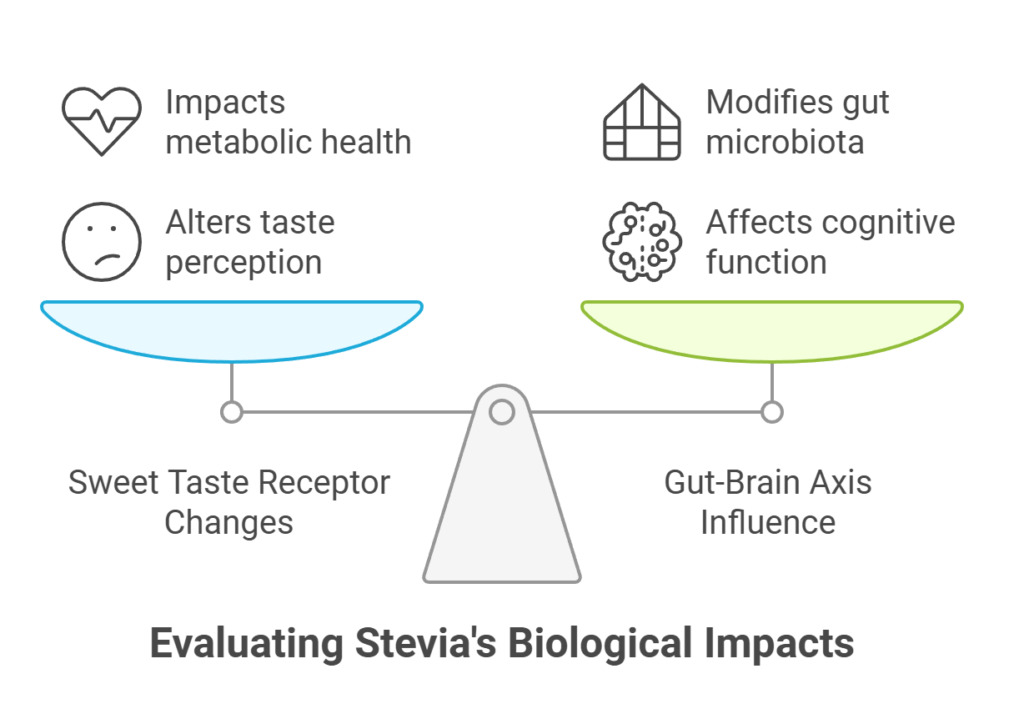Memory Loss and Stevia Consumption Facts You Should Know

Prefer listening? Check out the podcast version of this article.
You’ve probably heard about stevia as a popular sugar substitute, but did you know it might affect memory?
Recent studies suggest a potential link between stevia consumption and memory impairments, which could be particularly concerning for adolescents and even animals.

Even at FDA-approved levels, there’s evidence that stevia can influence cognitive functions.
But how exactly does it impact your brain, and are some individuals more susceptible than others?
It’s crucial to explore these questions, especially if you’re relying on stevia in your diet.
Let’s navigate through the latest insights and what they mean for your cognitive health.
Table of Contents
Examining Clinical Research
When examining clinical research on stevia’s impact on memory, it’s crucial to consider the diversity of findings across different studies.
You’ll encounter conflicting evidence regarding stevia metabolism effects and its potential role in cognitive decline prevention.
A 2022 study from the University of Southern California highlighted memory impairments in adolescents consuming stevia at FDA-approved levels, suggesting that stevia might negatively influence long-term memory retention.
This study observed rats with impaired memory performance, hinting at potential risks associated with stevia consumption.
Conversely, another 2022 study published in Nutritional Neuroscience portrayed stevia as a neutral sweetener.
It reported no significant impact on neuropsychological functions compared to artificial sweeteners, such as sucralose, which demonstrated negative cognitive effects.
Discover Your Path to a Longer, Healthier Life!
Take our free quiz to see how your lifestyle measures up to the world's longest-living communities and receive expert tips for a healthier, longer life.
Take the QuizThis study suggests that stevia mightn’t contribute to cognitive decline, offering a more reassuring perspective.
Balancing these findings, it’s essential to recognize individual variability.
Factors like age and overall health status can modulate how stevia’s metabolism affects cognitive function.
While some research indicates potential risks, others suggest minimal impact, making it vital for you to assess both immediate and long-term effects when considering stevia’s place in your diet.
Understanding Biological Mechanisms of Stevia
When consuming stevia, you’d notice that it can lead to changes in sweet taste receptors, which may alter your perception of sweetness and influence dietary choices.
Research indicates that these receptor alterations could interact with the gut-brain axis, a pathway linking intestinal health to cognitive function.

Scientists are actively studying how these changes might contribute to memory variations, highlighting the complexity of stevia’s physiological effects.
Sweet Taste Receptor Changes
Investigating sweet taste receptor changes offers critical insights into the biological mechanisms affected by stevia consumption.
When you consume stevia, it interacts with sweet taste receptors located on your tongue.
These receptors, specifically the T1R2 and T1R3 proteins, detect sweetness and initiate signaling pathways that influence your perception of sweetness.
Research indicates that regular stevia intake may lead to physiological changes in these receptors, potentially altering your taste preferences over time.
Moreover, these changes might extend beyond taste perception.
Alterations in sweet taste receptors could impact glucose metabolism and insulin sensitivity.
Some studies suggest that changes in these receptors may affect your body’s ability to process sugars, even though stevia itself contains no calories.
This could have broader implications for metabolic health, especially if you’re managing conditions like diabetes.
It’s important to consider that while some studies highlight these physiological changes, others find minimal impact.
The variation in findings underscores the need for more research to fully understand the long-term implications of stevia on sweet taste receptors and related biological processes.
Gut-Brain Axis Influence
Research into sweet taste receptor changes offers insights into stevia’s potential metabolic effects, but the gut-brain axis presents another intriguing dimension worth considering.
When you consume stevia, it can affect your gut microbiota balance, which plays a crucial role in your cognitive development.
The gut-brain axis is a bidirectional communication network that links your gastrointestinal tract with your central nervous system.
It involves complex interactions between hormones, immune responses, and neural pathways.
Recent studies have shown that altering gut microbiota through sweetener consumption, like stevia, can influence brain function.
In animal models, modifications in microbiota balance have been associated with changes in cognitive development, possibly affecting memory and learning processes.
However, these findings aren’t universally consistent, and the extent of stevia’s impact on the gut-brain axis in humans requires further exploration.
It’s crucial to understand that while some research suggests potential implications on the gut-brain axis, other studies highlight stevia’s relatively neutral profile compared to artificial sweeteners.

As the scientific community continues to investigate, staying informed about ongoing research can help you make more informed choices about stevia consumption and its potential effects on your cognitive health.
Maternal Consumption Concerns
Recent studies raise significant concerns about the effects of maternal stevia consumption on offspring’s cognitive development.
As a mother, your maternal diet directly impacts your child’s health, including their cognitive development.
Research highlights how a high-stevia diet during pregnancy might alter the gut microbiota of your offspring, influencing the gut-brain axis.
Such changes could potentially lead to memory and cognitive issues later in life.
Here’s a glimpse of what these findings could mean:
| Aspect | Potential Impact | Emotional Weight |
|---|---|---|
| Gut Microbiota | Alterations | Worry about long-term health |
| Cognitive Development | Impairment | Fear of developmental delays |
| Memory Function | Decline | Anxiety over future challenges |
These concerns are not to be taken lightly.
While some studies haven’t found significant adverse effects, the potential for long-term consequences is enough to warrant caution.
It’s essential to evaluate your dietary choices, considering both the immediate and future implications for your child’s brain function.
Balancing the benefits of natural sweeteners with their risks to offspring’s health is crucial.
You should consult healthcare professionals to understand better the complexities of these findings and make informed decisions regarding your maternal diet.
Recent Scientific Insights
Amidst the growing body of research on sugar alternatives, recent scientific insights into stevia’s effects on cognitive function offer a nuanced perspective.
The exploration of stevia benefits and potential cognitive enhancement has yielded varied conclusions.
Some studies highlight stevia’s ability to mimic sugar-like neural responses without the adverse effects associated with other sweeteners.
For instance, advanced imaging studies have demonstrated that stevia induces brain activity patterns closely resembling those of natural sugars.
This could suggest a more favorable cognitive profile compared to artificial sweeteners.
However, not all findings align.
Researchers have observed:
- Neutral cognitive impact: Unlike sucralose, stevia doesn’t significantly impair memory or executive functions.
- Potential adverse effects: Some animal studies report memory impairments at approved consumption levels.
- Variability: Individual responses to stevia may differ based on age or dietary habits.
- Underlying mechanisms: Changes in taste receptors and glucose transport pathways might contribute to cognitive effects.
These insights underscore the complexity of stevia’s role in cognitive health.
While stevia may offer certain cognitive benefits over other sweeteners, the full scope of its impact on brain function requires further investigation.
Balancing stevia consumption with a comprehensive understanding of its effects is crucial.
Long-term Cognitive Health
When considering the long-term cognitive health aspects of sweeteners, it’s crucial to recognize the potential risks associated with their consumption.

Research highlights that individual variability factors, such as age and health status, can significantly influence these risks and their impact on memory and cognitive function.
Risks of Sweeteners
Emerging evidence suggests that sweeteners, including stevia, might carry long-term cognitive health risks that warrant cautious consideration.
While stevia is often marketed as a natural sweetener alternative, research indicates potential links to cognitive decline.
Some studies have highlighted the impact of sweeteners on cognitive functions such as memory, with concerns about their interaction with brain activity.
However, it’s essential to weigh these findings against the backdrop of broader research.
Not all studies agree on the negative implications of sweeteners like stevia.
Some findings emphasize neutrality, suggesting no substantial impact on neuropsychological functions.
As you navigate these findings, consider the following:
- Sweetener alternatives: The choice between natural and artificial options may influence health outcomes.
- Research variability: Inconsistencies in study results highlight the complexity of drawing definitive conclusions.
- Biological mechanisms: Sweeteners can affect brain regions linked to memory and behavior.
- Long-term effects: The cumulative impact of sweetener consumption over time remains an area of active inquiry.
Incorporating these insights into your dietary decisions requires a nuanced understanding of the potential risks.
While stevia might offer a sugar substitute, staying informed about ongoing research and its implications for cognitive health is crucial.
Individual Response Differences
Individual responses to stevia consumption can vary significantly due to a multitude of factors.
Personal experiences and dietary habits play crucial roles in determining how stevia affects your cognitive function.
While some individuals report no noticeable changes in memory, others might experience alterations in cognitive performance.
It’s essential to consider that various elements can contribute to these differences, including:
- Genetic predispositions: Your genetic makeup can influence how your body metabolizes stevia and its impact on brain function.
- Gut microbiota composition: The balance of microorganisms in your digestive system may affect how stevia interacts with your brain’s cognitive pathways.
- Concurrent dietary patterns: Consuming stevia alongside certain foods or nutrients might alter its effects on memory.
- Age and life stage: Adolescents and older adults may experience different cognitive responses to stevia due to developmental and age-related factors.
The scientific evidence remains mixed, with some studies highlighting potential risks, while others find no significant impact.
It’s crucial to approach stevia consumption with an understanding of your unique physiological and dietary context.
By recognizing these individual differences, you can make informed decisions about incorporating stevia into your diet without compromising cognitive health.
Future Research Directions
As you consider the unique physiological and dietary factors that influence individual responses to stevia, it’s clear that current findings highlight the need for more targeted research.
Future studies should focus on understanding how stevia affects cognitive resilience, particularly by exploring its interactions with the gut-brain axis.
Lifespan Comparison Tool
Compare the life expectancy by the U.S. State
Given the role of microbiota in cognitive function, examining how stevia modifies gut health and its subsequent effect on brain activity will be crucial.
Researchers should employ longitudinal designs to assess these impacts over time and across different life stages.
Dietary interventions also need to be scrutinized, especially those involving varying dosages and forms of stevia.
By doing so, scientists can identify potential thresholds of consumption that might mitigate or exacerbate cognitive effects.
Additionally, research should explore the molecular mechanisms by which stevia influences neuroplasticity and memory-related neural pathways.
Translating findings from animal models to human studies is essential, ensuring that results are applicable to diverse populations.
These investigations will provide a more comprehensive understanding of stevia’s role in cognitive health, helping you make informed decisions about its place in your diet.
More robust evidence will ultimately guide future dietary guidelines and public health recommendations.
Conclusion
You’re now aware that stevia, even at FDA-approved levels, might affect memory, especially in adolescents.
The biological mechanisms behind this are complex, involving genetic predispositions and dietary factors.
Remember to be cautious, especially if you’re expecting, as maternal consumption could have implications.
Long-term cognitive health is crucial, so think of stevia like a telegram—a once-popular choice now questioned.
As research evolves, stay informed and prioritize a balanced, nutrient-rich diet to mitigate potential risks.

 972-393-1699
972-393-1699





